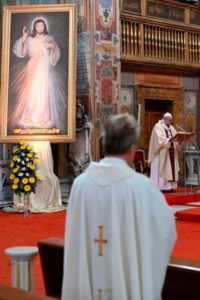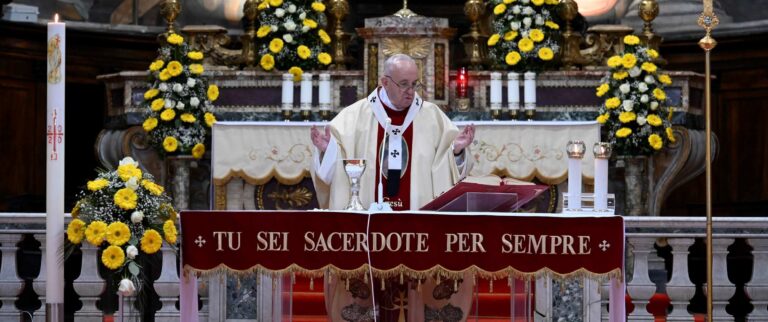
ROME (CNS) — As the world slowly recovers from the COVID-19 pandemic, there is a risk it will be struck by an even worse virus — that of selfish indifference, Pope Francis said.
This dangerous virus is “spread by the thought that life is better if it is better for me and that everything will be fine if it is fine for me. It begins there and ends up selecting one person over another, discarding the poor and sacrificing those left behind on the altar of progress,” he said in his homily at a Mass on Divine Mercy Sunday, April 19.
The current pandemic instead must compel people to prepare for a “collective future” that sees the whole human family as one and holds all of the earth’s gifts in common in order to be shared justly with those in need, he said.
“This is not some ideology: it is Christianity,” and it mirrors the way the early Christian community lived, the pope said at the Mass, celebrated privately at Rome’s Church of the Holy Spirit, which houses a shrine dedicated to Divine Mercy.
The Mass was celebrated on the 20th anniversary of St. John Paul II’s declaration that the Sunday after Easter would be celebrated as Divine Mercy Sunday. The Divine Mercy movement was founded in the early 1900s by Polish St. Faustina Kowalska, who said Jesus told her he wanted a feast of Divine Mercy as a refuge and shelter for all souls.
In his homily, Pope Francis noted that St. Faustina said Jesus told her, “I am love and mercy itself; there is no human misery that could measure up to my mercy.”
The Lord always patiently and faithfully waits for people to recognize their failings and sins and to offer them to him “so that he can help us experience his mercy,” the pope said.

Even the disciples, and especially St. Thomas, experienced fear and doubt, failing to believe in the risen Lord right away, the pope said.
Jesus doesn’t scold them with a sermon because “he wants us to see him not as a taskmaster with whom we have to settle accounts, but as our father who always raises us up,” just like any father would when his child falls, the pope said.
“The hand that always puts us back on our feet is mercy: God knows that without mercy we will remain on the ground, that in order to keep walking, we need to be put back on our feet,” he said.
Right now, he said, the world is undergoing a “time of trial” and, like St. Thomas, “with our fears and our doubts, (we) have experienced our frailty. We need the Lord, who sees beyond that frailty an irrepressible beauty,” like a crystal that is delicate, but precious and transparent before God who lets his light of mercy “shine in us and through us in the world.”
The most beautiful message on the feast of Divine Mercy, the pope said, comes from St. Thomas, “the disciple who arrived late,” but for whom the Lord waited, not leaving him behind.
“Now while we are looking ahead to a slow and arduous recovery from the pandemic, there is a danger that we will forget those who are left behind. The risk is that we may then be struck by an even worse virus, that of selfish indifference,” he said.
The COVID-19 pandemic “reminds us that there are no differences or borders between those who suffer,” he said. “We are all frail, all equal, all precious.”
“May we be profoundly shaken by what is happening all around us: the time has come to eliminate inequalities, to heal the injustice that is undermining the health of the entire human family,” the pope urged.
“Let us welcome this time of trial as an opportunity to prepare for our collective future,” the pope said, because without a vision that embraces everyone, “there will be no future for anyone.”
“Let us show mercy to those who are most vulnerable for only in this way will we build a new world,” he said.
The prayers of the faithful at the Mass asked God for consolation, mercy and strength for the church, government leaders, priests, Christians, health-care workers, volunteers and the homeless during the global pandemic.
“May priests always administer the sacrament of reconciliation with a merciful heart and in this period of enforced solitude, may they offer forgiveness and consolation through every means,” one petition prayed.
“May all the baptized not let themselves be intimidated by the inconveniences and sufferings from these weeks, but may they know how to give spiritual comfort and material support generously to all those who are in a precarious situation,” said another petition.
After Mass, before praying the “Regina Coeli,” the pope said Christians must respond to life’s storms with mercy and compassion toward everyone, especially those who suffer, are abandoned or in need.
“May Christian mercy also inspire the just sharing among nations and their institutions in order to face the current crisis in solidarity,” he said.
The pope ended his midday address by offering Easter greetings to Orthodox and Eastern Catholics celebrating according to the Julian calendar and thanking those Eastern-rite Catholics who were also celebrating the same day as a gesture of ecumenism and fraternity.
Because of restrictions in place to curb the spread of the coronavirus, the Divine Mercy Mass was celebrated without the presence of the public, with only a small choir and with only two concelebrants: Archbishop Rino Fisichella, president of the Pontifical Council for Promoting New Evangelization, and Msgr. Jozef Bart, the church rector.
St. John Paul visited the church in 1995 and canonized St. Faustina in 2000, proclaiming the second Sunday of Easter as Mercy Sunday throughout the world. The Polish pope’s death in 2005 came on the eve of Mercy Sunday, and his beatification in 2011 and canonization in 2014 were celebrated on Mercy Sunday.


